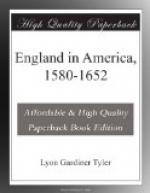From this time the colony may be said to have secured a permanent footing. The court of assistants, who had suspended their sessions during the winter, now began to meet again, and made many orders with reference to the economic and social affairs of the colonists. There were few natives in the neighborhood of the settlement, and Chickatabot, their sachem, anxious to secure the protection of the English against the Taratines, of Maine, visited Boston in April and established friendly communications.[10] At the courts of elections of 1631, 1632, and 1633 Winthrop was re-elected governor. His conduct was not deemed harsh enough by some people, and in 1634 Thomas Dudley succeeded him. In 1635 Jonn Haynes became governor, and in 1636 Henry Vane, known in English history as Sir Harry Vane, after which time the governorship was restored to Winthrop.
Puritanism entered the warp and woof of the Massachusetts colony, and a combination of circumstances tended to build up a theocracy which dominated affairs. The ministers who came over were among the most learned men of the age, and the influence which their talents and character gave them was greatly increased by the sufferings and the isolation of the church members, who were thus brought to confide all the more in those who, under such conditions, dispensed religious consolation. Moreover, the few who had at first the direction of civil matters were strongly religious men, and inclined to promote the unity of the church by all the means at hand.
We have noticed the turn of affairs given by Endicott at Salem, and how Winthrop followed his example on his arrival at Charlestown. After the court of assistants resumed their meetings in March, 1631, the upbuilding of the theocracy was rapidly pushed. Various people deemed inimical to the accepted state of affairs were punished with banishment from the colony, and in some cases the penalties of whipping, cropping of ears, and confiscation of estate were added. In some cases, as that of Sir Christopher Gardiner, a secret agent of Sir Ferdinando Gorges, there was reason for parting with these people; but in other cases the principle of punishment was persecution and not justice. There is a record of an order for reshipping to England six persons of whose offence nothing more is recorded than “that they were persons unmeet to inhabit here."[11]
The most decided enlargement of the power of the theocracy was made in the general court which met at Boston in May, 1631, when it was resolved that the assistants need not be chosen afresh every year, but might keep their seats until removed by a special vote of the freemen.[12] The company was enlarged by the addition of one hundred and eighteen “freemen”; but “to the end that the body of the commons may be preserved of honest and good men,” it was ordered that “for the time to come no man should be admitted to the freedom of this body politic but such as are members of some of the churches within the limits of the same.”




